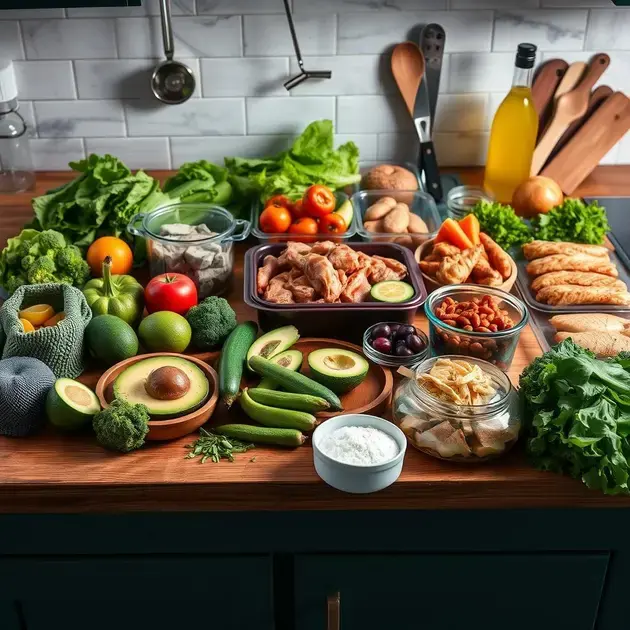Food on a Keto Diet: What are the Basics?
Embarking on a ketogenic diet can be overwhelming for beginners, but grasping the basics of what to eat is key to success. To navigate the world of keto-friendly foods, understanding the principles behind this low-carb, high-fat diet is crucial. From lean meats and leafy greens to avocados and nuts, discover the essential components needed to thrive on a keto diet.

Key Benefits of a Keto Diet for Beginners
Understanding Ketogenic Diet Basics
When starting a keto diet as a beginner, it’s crucial to understand the basics. The primary principle of a ketogenic diet is to significantly reduce carbohydrate intake and replace it with healthy fats. This shift in macronutrients forces the body to enter a state of ketosis, where it burns fat for energy instead of carbohydrates. Understanding this fundamental concept will help you make informed food choices and stay on track with your diet.
Step 1: Limit Carbohydrate Intake
Begin by restricting your carb consumption to around 20-50 grams per day to induce ketosis. Focus on consuming high-fat, moderate-protein foods to help your body enter and maintain this metabolic state.
Step 2: Include Healthy Fats and Lean Proteins
Choose sources of healthy fats such as avocados, olive oil, nuts, and fatty fish while incorporating lean proteins like chicken, turkey, and tofu into your meals. These nutrients will provide satiety and fuel your body efficiently.
Step 3: Monitor Your Progress
Track your daily food intake to ensure you are staying within the recommended macronutrient ratios. Use tools like food diaries or mobile apps to monitor your progress and make adjustments as needed.
Step 4: Stay Hydrated and Manage Electrolytes
Hydration is essential on a keto diet to support your body’s functions. Incorporate electrolyte-rich foods like leafy greens and nuts to prevent imbalances and support overall health while on the diet.
Step 5: Seek Support and Guidance
Join keto-friendly communities or seek guidance from nutritionists or dietitians specializing in ketogenic diets. Having support and expert advice can enhance your understanding of the diet and keep you motivated on your journey.
Essential Components for Success on a Keto Diet
Importance of Meal Planning
Meal planning plays a crucial role in achieving success on a keto diet. By preparing your meals in advance, you can ensure that you have keto-friendly options readily available, avoiding the temptation of high-carb foods.
Step 1: Create a Weekly Meal Plan
Start by planning your meals for the week ahead. Include a variety of keto-friendly recipes that align with your dietary preferences and nutritional goals. This will help you stay on track and avoid making impulsive food choices.
Step 2: Preparing and Pre-Packaging Meals
Set aside time each week to cook and pre-package your meals. Having pre-prepared meals makes it convenient to grab a healthy option when hunger strikes, preventing you from reaching for non-keto foods.
Step 3: Stock Your Pantry with Keto Essentials
Ensure your pantry is stocked with essential keto ingredients like coconut oil, nut flours, and sugar alternatives. Having these staples on hand will make it easier to whip up keto-friendly dishes whenever you need them.
Step 4: Incorporate Variety and Flavor
Experiment with different ingredients and flavors to keep your meals exciting and enjoyable. Adding herbs, spices, and low-carb sauces can enhance the taste of your dishes while ensuring you stick to your keto diet.
Step 5: Practice Portion Control
Pay attention to portion sizes to prevent overeating, even with keto-friendly foods. Use measuring cups or a food scale to ensure you are consuming the right amount of fats, proteins, and carbs to maintain ketosis. This practice is essential for long-term success on a keto diet.
Navigating the World of Keto-Friendly Foods
Identifying Keto-Friendly Whole Foods
When following a keto diet, it’s essential to focus on whole, nutrient-dense foods that are low in carbohydrates and high in healthy fats. By choosing the right ingredients, you can create delicious and satisfying meals that support your health goals.
Step 1: Go for Low-Carb Vegetables
Incorporate low-carb vegetables like spinach, broccoli, cauliflower, and zucchini into your meals. These veggies are rich in fiber, vitamins, and minerals while being low in net carbs, making them ideal for a keto diet.
Step 2: Choose Quality Proteins
Select high-quality proteins such as grass-fed beef, free-range poultry, and wild-caught fish. These sources of protein not only support muscle health but also provide essential nutrients without adding excess carbohydrates to your diet.
Step 3: Opt for Healthy Fats
Include healthy fats like avocado, olive oil, coconut oil, and nuts in your meals. These fats promote satiety, support brain function, and provide a steady source of energy on a keto diet.
Step 4: Explore Keto-Friendly Snacks
Keep keto-friendly snacks on hand for quick and convenient options between meals. Snacks like cheese, nuts, seeds, and olives are portable, satisfying, and help you stay on track with your dietary goals.
Step 5: Read Labels and Ingredients Lists
When purchasing packaged foods, always read the labels and ingredient lists carefully. Look for hidden sugars, starches, and additives that may affect your ketosis. Opt for products with minimal ingredients and no added sugars to ensure they align with your keto diet.

Understanding the Importance of Quality Food on a Keto Diet
When following a keto diet, the quality of food you consume plays a crucial role in your overall health and success. High-quality, nutrient-dense foods are essential to maintain ketosis and support your body’s nutritional needs. Opting for fresh, whole foods instead of processed alternatives ensures that you receive the necessary vitamins, minerals, and macronutrients necessary for maintaining energy levels and metabolic function on a keto diet.
Quality food choices on a keto diet typically include lean proteins such as poultry, fish, and tofu, healthy fats like avocado and olive oil, and low-carb vegetables such as spinach, broccoli, and cauliflower. These foods provide essential nutrients while keeping carbohydrate intake in check, helping you stay in ketosis and achieve your weight loss or health goals.
By prioritizing quality food options on a keto diet, you not only enhance the effectiveness of your dietary plan but also support overall well-being. Choosing organic, pasture-raised, and minimally processed foods can further amplify the benefits of the keto diet, ensuring that you nourish your body with the best possible ingredients for optimal health and vitality.
Emphasizing quality food on a keto diet sets the foundation for long-term success and sustainable lifestyle changes. By understanding the importance of selecting high-quality ingredients, you empower yourself to make informed decisions that promote wellness, weight management, and overall vitality while following a keto regimen.
Incorporating Variety and Flavor into Your Keto Meals
Despite the common misconception that a keto diet can be monotonous, there are numerous ways to incorporate variety and flavor into your meals while staying true to the principles of low-carb, high-fat eating. Experimenting with different herbs, spices, and seasoning blends can transform simple ingredients into culinary delights that satisfy your taste buds and keep you excited about mealtime.
One effective strategy for adding variety to your keto meals is to explore diverse cooking methods such as grilling, roasting, sautéing, and slow cooking. Each technique imparts unique flavors and textures to your dishes, ensuring that you never feel bored or restricted by the limitations of the keto diet.
Furthermore, incorporating a wide range of low-carb vegetables, nuts, seeds, and dairy products can introduce new tastes and nutritional profiles to your meals. Don’t be afraid to experiment with different combinations and recipes to discover exciting flavor pairings that align with your dietary preferences and goals.
Remember that variety and flavor are key components of a sustainable and enjoyable keto eating plan. By embracing diverse ingredients and culinary approaches, you can create a repertoire of delicious, satisfying meals that support your health, weight management, and overall well-being on a keto diet.
Tips for Budget-Friendly Yet Nutritious Food Choices on a Keto Diet
Adhering to a keto diet doesn’t have to break the bank. With strategic planning and smart shopping choices, you can enjoy nutritious, satisfying meals without compromising your budget. One effective tip is to prioritize affordable, staple keto ingredients such as eggs, canned tuna, ground beef, and seasonal vegetables, which offer high nutritional value at reasonable prices.
Consider purchasing ingredients in bulk or taking advantage of sales and discounts to stock up on essential items for your keto pantry. This approach can help you save money in the long run while ensuring that you always have a variety of options on hand to create delicious, cost-effective meals.
Meal prepping and batch cooking are additional strategies that can help you stick to your budget while following a keto diet. By preparing large quantities of food in advance and portioning them out for multiple meals, you can minimize waste, save time, and avoid the temptation of ordering expensive takeout or convenience foods.
Lastly, don’t overlook the value of frozen or canned keto-friendly foods, which can be just as nutritious as fresh options but come at a lower price point. Incorporating frozen vegetables, canned seafood, and bulk nuts and seeds into your meal plans allows you to enjoy a diverse range of nutrient-dense foods without overspending on groceries.
Conclusion
Embarking on a keto diet as a beginner can be a transformative journey towards better health and weight management. By understanding the key principles of this dietary approach, such as reducing carbohydrate intake and prioritizing healthy fats, you empower yourself to make informed food choices. Implementing meal planning, monitoring your progress, and staying hydrated are essential steps that contribute to your success while on this diet.
Diverse food options and quality ingredients are crucial for sustaining your keto lifestyle. Incorporating a range of low-carb vegetables, healthy fats, and high-quality proteins not only enhances your meals but also ensures that you receive vital nutrients. Additionally, experimenting with flavors and cooking methods can make your keto journey enjoyable and delicious, breaking the stereotype of bland eating.
Finally, maintaining a budget-friendly approach to your keto diet is achievable with strategic planning and smart shopping. By stocking up on essential items, meal prepping, and utilizing frozen or canned foods, you can enjoy the benefits of a ketogenic diet without overspending. Ultimately, the key to a successful keto journey lies in your commitment, creativity, and connection to supportive communities that keep you inspired and motivated.
